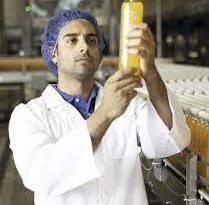Food Microbiologist

In the intricate world of food production, safety and quality are paramount concerns. Ensuring that the food we consume is free from harmful pathogens and contaminants requires a multidisciplinary approach, with one key player being the food microbiologist. These dedicated professionals delve into the microscopic realm, studying the intricate interactions between microorganisms and food, and employing their expertise to safeguard public health. In this article, we will explore the pivotal role of food microbiologists, their duties, qualifications, and the significance of their contributions to the food industry.
Understanding the Role
Food microbiologists are scientists specializing in the study of microorganisms that affect food. Their primary objective is to identify, analyze, and control microorganisms to prevent foodborne illnesses and spoilage. They work across various sectors of the food industry, including production, processing, packaging, and distribution. Their duties encompass:
- Microbial Analysis: Food microbiologists conduct rigorous analyses to detect and quantify microorganisms present in food samples. Using advanced laboratory techniques such as culturing, molecular biology, and microscopy, they identify pathogens like Salmonella, E. coli, and Listeria, as well as spoilage organisms such as molds and yeast.
- Quality Assurance: They play a crucial role in quality assurance programs, ensuring that food products meet regulatory standards and consumer expectations. By monitoring microbial populations and assessing food safety protocols, they help prevent contamination and maintain product integrity.
- Research and Development: Food microbiologists engage in research to develop innovative methods for microbial control and preservation. This includes exploring novel antimicrobial agents, studying microbial ecology in food environments, and optimizing food processing techniques to enhance safety and shelf life.
- Regulatory Compliance: They assist food manufacturers in adhering to regulatory requirements set by government agencies such as the Food and Drug Administration (FDA) and the World Health Organization (WHO). This involves implementing Hazard Analysis and Critical Control Points (HACCP) plans, conducting audits, and ensuring compliance with sanitation and hygiene standards.
- Outbreak Investigation: During foodborne illness outbreaks, food microbiologists play a vital role in epidemiological investigations. They collaborate with public health agencies to trace the source of contamination, analyze samples from affected individuals and food products, and implement corrective measures to prevent further spread.
Qualifications and Skills
Becoming a food microbiologist requires a solid educational foundation and specialized training. Most professionals in this field hold a bachelor’s degree in microbiology, food science, or a related field, although advanced degrees such as master’s or doctorate are common for those pursuing research or leadership positions. Key qualifications and skills include:
- Strong Background in Microbiology: A comprehensive understanding of microbial physiology, genetics, and ecology is essential for interpreting data and designing effective control strategies.
- Laboratory Proficiency: Proficiency in laboratory techniques, including microbial isolation, enumeration, and identification, is fundamental for conducting accurate analyses and experiments.
- Analytical Skills: Food microbiologists must possess strong analytical skills to interpret complex data, identify trends, and draw meaningful conclusions regarding food safety and quality.
- Regulatory Knowledge: Familiarity with food safety regulations and standards enables food microbiologists to ensure compliance and facilitate communication with regulatory agencies.
- Communication and Collaboration: Effective communication skills are vital for collaborating with colleagues, presenting research findings, and educating stakeholders about food safety practices.
- Problem-Solving Abilities: Food microbiologists must be adept at identifying and addressing challenges related to microbial contamination, product development, and process optimization.
Significance in the Food Industry
The contributions of food microbiologists are indispensable for maintaining the safety and integrity of the global food supply. By proactively identifying and mitigating microbial risks, they help prevent foodborne illnesses, which pose significant public health and economic burdens. Additionally, their research efforts drive innovation in food preservation technologies, allowing for the development of safer and more sustainable food products.
Furthermore, food microbiologists play a crucial role in supporting international trade by ensuring that exported food products meet the stringent regulatory requirements of importing countries. By conducting thorough risk assessments and implementing robust quality assurance measures, they help facilitate the smooth flow of food commodities across borders while safeguarding consumer health and confidence.
In the wake of emerging food safety challenges such as antimicrobial resistance and climate change, the expertise of food microbiologists is more critical than ever. Their interdisciplinary approach, combining microbiology, food science, and public health principles, positions them as key players in addressing complex issues affecting the global food system.

Conclusion
Food microbiologists are unsung heroes in the realm of food safety and quality. Their tireless efforts behind the scenes ensure that the food we consume is safe, wholesome, and free from harmful contaminants. Through their expertise in microbiology, research, and regulatory compliance, they serve as guardians of public health, driving continuous improvement and innovation in the food industry. As we navigate an increasingly complex and interconnected food landscape, the importance of food microbiologists in safeguarding our well-being cannot be overstated.



